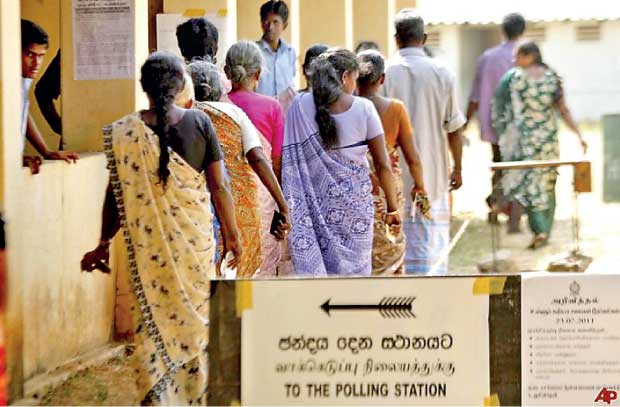Reply To:
Name - Reply Comment

The Citizens’ Movement for Good Governance (CIMOGG) refers to the article titled “LET’S THROW OUT THE COMPLEX ‘MIXED VOTING’ SYSTEM FOR GOOD” by Bernard Fernando that appeared in the DAILY MIRROR on 7 December. “Mixed voting” was, in fact, only one of the matters discussed by him in his contribution whereas he has made useful suggestions on other Constitution-related issues as well.
There are probably thousands of Sri Lankan citizens who have their own strong views on what particular provisions they would like to see included in the proposed new Constitution. Among them, Fernando has been particularly persistent in presenting to the public certain key features that he favours. Whilst CIMOGG does not concur with him unreservedly, it does support in principle a number of his recommendations that are similar to those that CIMOGG has advocated over many years. Stated in the briefest of terms, we believe the public should study the following list and press for the inclusion of these terms in the Constitution:
1. Recognising the equality of all citizens bereft of considerations such as race, religion or caste. This would be the only permanently reliable way of encouraging every citizen to contribute to the realisation of an all-inclusive Sri Lankan identity that will eliminate much of the primitive emotions and wasted resources that racial, religious and similar conflicts involve.
2. Introducing the ‘Grama Rajya’ or equivalent concept and de-politicising elections to the relevant peripheral assemblies by allowing good quality candidates to come forward without the sponsorship of political parties. Thus, they would gain the opportunity of earning for themselves a personal reputation for honesty, competence and hard work and not rely vicariously on the popularity of party leaders.
3. Ensuring the administrative effectiveness of local bodies by assigning clearly specified functions to them and providing them with funding from the Centre without allocating any funds directly to MPs, who would tend to use such funds to promote their own private interests.
4. Making party election manifestos legally binding to whatever extent may be practicable.
5. Reducing the numbers of elected representatives drastically and specifiying clearly their duties and attendance requirements. For example, there is no use in having 225 MPs, as we do at present, and being told that only about eight of them had attended the recent meeting of the Constituent Assembly (of which all of them are mandatory members) to consider the report of the Steering Committee regarding the writing of a much-needed new Constitution. It would be infinitely more preferable, instead of having such a worthless bunch of irresponsible and unscrupulous layabouts, to elect a much smaller number of conscientious people’s representatives who are pre-qualified by a suitable selection process as persons possessing a good reputation for honesty and social responsibility, as well as a reasonable practical knowledge of the law, accountancy and other specialised areas of knowledge such as agriculture, exports, engineering, information technology etc.
6. Requiring that the President should be non-executive and prohibiting his participation in party politics.
These are just a very few of the important ingredients that should be included in a new Constitution. However, the unfortunate reality is that these and other progressive ideas have virtually no chance of being included in any Constitution that is required to be approved by a Parliament, such as the present, of which most members have not even passed the Ordinary Level examination and have not previously worked in reputable organisations that have a logical structure, strict administrative procedures and little room for dishonesty or blatantly immoral behaviour. Our MPs know that, if they agree to the making of a strong Constitution, over 90 per cent of them would have to say good-bye to their undeserved political careers soon thereafter. What then can the public do to remove this self-perpetuating obstacle to improving governance?
One must try to take advantage of these brief periods of wakefulness because it is at these moments that voters become sufficiently active to make an effective impact by sending the right message through their votes
Ever since we gained independence, the progressively increasing ineptness and criminal dishonesty of too many of our elected representatives can be most readily traced to the deeply-entrenched passivity and inertia of Sri Lankan voters.
The only times that large numbers of citizens rouse themselves from their slumber is when election nominations are announced. One must try to take advantage of these brief periods of wakefulness because it is at these moments that voters become sufficiently active to make an effective impact by sending the right message through their votes.
For a start, voters should be persuaded to forget about Mahinda Rajapaksa, Maithripala Sirisena, Ranil Wickremesinghe and those parties for which most voters have been blindly casting their votes in previous years. Instead, they should be urged to cast their votes during the forthcoming Local Government Elections for the most honest and competent of the candidates in their small electoral units irrespective of their political allegiances. If the public heeds this appeal, there would be a remarkable enrichment of the pool of able persons of integrity from which the candidates for election to Provincial Councils and Parliament could be nominated subsequently.
Dr A.C.Visvalingam
President, CIMOGG
www.cimogg-srilanka.org
[email protected]